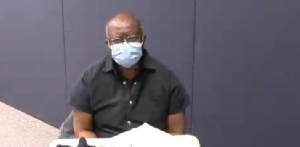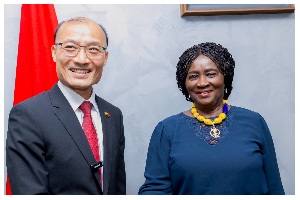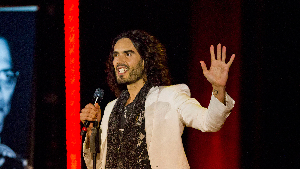... with some interesting characters
GhanaHomePage still remains the most popular portal for Ghanaians around the world – the oldest and the best. We all remember the promptness with which the British High Commission in Accra responded to Kwami Agbodza’s free market article accusing it of discrimination. The site is quoted by other news organisations in Ghana. It is read by anybody with an interest in Ghana – Peace Corps once stationed there, past and intending tourists, our children born abroad and other Africans keeping an eye on happenings in Ghana.A certain friendly atmosphere has evolved among regulars of the forum. They may never have seen each other before but have met so regularly on the forum that they are, at times, on first name terms. Sometimes, when a regular disappears, people ask of them and when they return, they are welcome back. We all knew of Bernard Tetteh’s hospitalisation and wished him speedy recovery. Who are those who make the forum a worthwhile place to visit? They are so many that and I can only describe a few.
It is only proper to start a description of some of the stalwarts of GHP with Kwame Okoampa-Ahoofe, Associate Prof at a community college. He has written nearly 250! articles to GHP. He will not deign to take part in the discussions in the forum, not even of his own articles. He believes it is always better to use a “big word” rather than a more commonly used one. He lacks the ability to use ordinary words in refreshingly novel ways or hit that subtle turn of phrase that makes you gasp in admiration. As it is, he impresses only those who don’t know about such things. Remove his “big words” and stock phrases and the rest of his writing is extremely ordinary, even bland. He is one who will easily win a competition testing the knowledge of obscure words but hardly turn out a critically acclaimed novel. No wonder he has not become the literary giant that he so desperately dreams of despite his 20 published books. He believes blue blood runs through his veins and uses the royal plural pronoun to refer to his individual self. His pieces are almost always met with a deluge of insults but he is completely impervious to them and continues to churn out articles with irritating frequency. It is worrying that he alone writes so much. But for all his haughtiness and bigotry, I will defend his right to say whatever he wants to in whichever way he wants. I regard him as one of the colossal figures on the GHP and when he was absent for some days recently, I started kind of ... missing him.
NANA AMMA OBENEWAA is, arguably, the uncrowned “queen” of GHP whose presence or absence can never be missed. Some people have strong evidence to believe she is a man masquerading under a feminine name.. But aren’t many of us on the forum something other than what we are in the real world? NAO can write some very sublime sentences but when she turns blatantly poetical as in “what a day tomorrow brings, ... as we sink with an ink on the silk and blink with a wink, in pink” you feel like you’re reading an excerpt from a magazine devoted to publishing poetry rejected by other magazines. I do not really dig her tendency to belabour her point often writing rather lengthy responses. Despite infusing her pieces with Ewe and Akan phrases, her mastery of both languages seems suspect – a bit strange, given the ease with which she writes the English language. NAO may insult particular policies and ideas and even public figures (fair game) but NEVER other forumers, even though she has often been at the receiving end of some unfair comments and the butt of some vicious jokes. No matter what you think of her, she remains, without doubt, one of the true giants of GHP and a great resource to us all.
Bernard Tetteh doesn’t write feature articles to the GHP but his presence looms large on the forum. He doesn’t write articles perhaps because he is following his own dictum espoused in his sole article on grey matter on ghanaweb. Instead, he has earned a reputation for being one of the most fearsome critics on GHP. BT can be very caustic and venomous, sometimes even mordant. I won’t be surprised if some people have chickened out of taking him on because of this which is a pity since he is often only jesting. Through all the pungency of his writing, he often comes out with some very trenchant remarks backed up with lots of archival material. Where he gets them from, I don’t know. He seems widely travelled and well read and may have been involved in some of the events in our country’s recent history since he displays such thorough knowledge of them. It is for these that he adds some real worth to our discussions. I have been looking forward to the day he will deploy the full range of his formidable critical talents on Okoampa.
Prof Lungu is one of the most serious contributors to GHP. He has said his name is a moniker but he could as well be a Professor and he admits he can answer to the call of an instructor. He, more than anyone else, calls for a strictly Ghana centred orientation in our discussions eschewing all tribal and religious narrow-mindedness. It appears he reads critically every ITEM (his favourite highlighter, READ – his other one) on GHP.. His language is straightforward and clear rather than fanciful and the writing is restrained. He never insults anyone. If there is a perfect cyber gentleman among us, he is perhaps the one. Everyone knows about his pet project, FOIB, to which he has devoted his own site. He does the vocals on the FOIB song which is available to anyone who asks him. It is a bit difficult to connect his voice with his writings, though. Are you pickable, Prof Lungu, or just a closet CPP supporter?
SARPONG, the true SARPONG with an 8 am to 6 pm job in Texas, is another GHP faithful worth mentioning here. He has declared that he doesn’t insult anyone – unless you insult him first. If you do, a barrage of abusive verbiage, pressed down and overflowing, will issue forth from his fingertips. He can give as much as he takes – with a little more. But if you leave him alone, he does his best to be fair in his comments while keeping to his twin chores of proclaiming the NPP message and telling the world of the atrocities committed by Rawlings.
For lack of space, I will mention only a few more in passing some of whom are my personal favourites not so much for what they say but how they say it. Samuel Sarfo Adjei (great critic with strong language who is not often here these days), Okunka (whose language has been described as “sweet” – see The Way Things Ougtta Be’s posting, June 4), Tawiah (Shakespeare drips from his every sentence), Pryce (the gentle one whose Oprah Winfrey type topics have become quite popular with readers), Afreh (masterfully tunes his language to the audience and occasion), PEACE-MAKER (in his best moments can still be acerbic with his sharp tongue), SENDERO (free market lover with a lot of knowledge of obscure historical facts – know the name of Nkrumah’s first wife?), Kofi Akosa-Sarpong (a writer with minimal talent trying hard to reach beyond his abilities), Black Hero, Duusuru, Kwame Kyeremeh, Oliver Twist the original, oh, and also that guy who has dared not show his face again after his campus life hard article, and many, many more including several good one-time writers. Too bad there are too few ladies who are regulars. The more important ones are esi begyina (serious critic on a wide variety of issues), Lola (writes from Washington but has been turned off by the spate of insults on the site) and Blessings (where are you these days, Yayra?). When Junior Hitler was asked why he started adding PhD to his name, he admitted that even though he had never defended a PhD thesis he felt if Okoampa, of all people, could add those letters to his name, he too could do so. Today, he is simply Junior PhD. Such is the mix of personalities we have – a vibrant lot, I would say.
They come from all the corners of the world. Akoto places the articles around 0700 CET on weekdays. When SARPONG comes from work and sits down in the evening to read the day’s articles, Prof Lungu in Japan may be reading the same articles at the same time but, for him, on a different day. On weekends, Akoto posts the articles late – even he, too, has to sleep a bit longer at the weekends.
Most visitors are young people. Some have told us their ages. Wofa Danso has informed us he is in his 60s, a long time US resident but a keen observer of the national scene. Quainoo, writing from down under, attended some of the commissions of enquiry set up after the overthrow of Nkrumah – guess his age... Okoampa-Ahoofe said there is a difference of a score year between him and Kufuor. Sarfo-Adjei was four when Nkrumah was overthrown. It is more difficult to place the age of NAO who was a student in Rawlings’ early days(?). Judging from Prof Lungu’s avuncular comportment, he is not a young man but when you recall that he had dreadlocks, you will conclude he may not be that old. The two Bernards have not given any clues but Afreh said it was “nerve-wracking” to be referred to as a “small boy”. Read the others carefully and you will note most are young. Some are still in university and many have not known any other government in Ghana apart from those of Rawlings and Kufuor.
Most visitors have a university qualification and some flaunt their higher degrees. My suspicion is that there are quite a few PhD holders writing for us who do not talk about their degrees. It will be interesting to see their academic work but since most of them use monikers, googling may not help you. Those living in the USA can be identified by their American writing styles. Some of them use expressions they would never have known to use had they not left the shores of Ghana. Well, professors Anthony Appiah and George Ayittey are not about to send feature articles to GHP or take part in our discussions but there is still enough good stuff there to make the place worth visiting.
GHP has made a few improvements from the chaos of last year. It is no longer possible to “flood” any one article with your comments. Every contributor has what NAO, with characteristic flair, describes as a “goodwill account” of 10 postings. But you can circumvent this restriction by posting your contribution under the same name from a computer with a different ip address. A 12 hour limit prevents people from making contributions using different names. There are still a few things GHP can do. They can edit at least titles especially those with obvious mistakes. Articles that come out badly when posted (like those in which the lines are truncated in ways not intended by the writer) can be reposted correctly. The number of characters a contributor can put in a title is now limited to 35. A limit of 40 will be better. And won’t it be just good to limit articles from each contributor to no more than two per week? Then Ahoofe will not write an article every day!
I have a few suggestions for new columnists. Read through your work carefully before submitting it. If possible give it to someone to read through – it is easier for others to see our petty mistakes. Do not use italics or bold letters – you cannot be sure GHP will maintain them. Provide sufficient gaps between paragraphs and subheadings. If you want many people to read your piece, choose a controversial topic. Dry ‘book-long’ subjects attract few readers. Reserve those for your academic conferences where you meet your peers. Short articles are attractive to readers. Keep it to a maximum of 2000 words (which makes my present piece too long). If you write well, you should be able to say all you want to in one piece and will not need to divide a topic into two or three parts spread over as many weeks. Why put your readers through the tedium of a boring two-part series? A journalistic, rather than an academic, style should be preferred. Avoid footnotes and detailed references. The Ghanaians reading these pages are from all the strata of our society. Remember that fact.
The insults will never stop. Why should they? The site risks becoming dull if they do. We won’t even be true Ghanaians if we don’t have a few harsh words for each other. We can do without the excesses, though. Fortunately, most visitors are courteous. As for tribalism, what we see on GHP is a reflection of the national one which can be said to pit mainly (but not exclusively) Ewe speakers against Akan speakers – Ayigbefuo vrs Eblutowo. Ayigbefuo bundles together all Awunas (Anlos) and Ewedomes but in the collective consciousness of Ewes, Fantis may not really occupy the centre stage of Eeblutowo which space is reserved particularly for the Ashanti but also Kwawu, Akwapim and Akyem. But any undergraduate student writing a term or course paper on tribalism on GHP will have only scanty pickings. I don’t think tribalism on the site is widespread. It is indulged in consistently by only a wayward few who can easily be ignored (I won’t mention names even though one comes readily to mind – yes, your guess is as good as mine). At any rate, isn’t it better we play out our tribal hatreds in the virtual rather than the real world?
This brief review should not end without thanking Francis Akoto and his team for providing Ghanaians worldwide the chance to freely discuss both the serious, and the not so serious, matters affecting our motherland – and also to insult each other.















